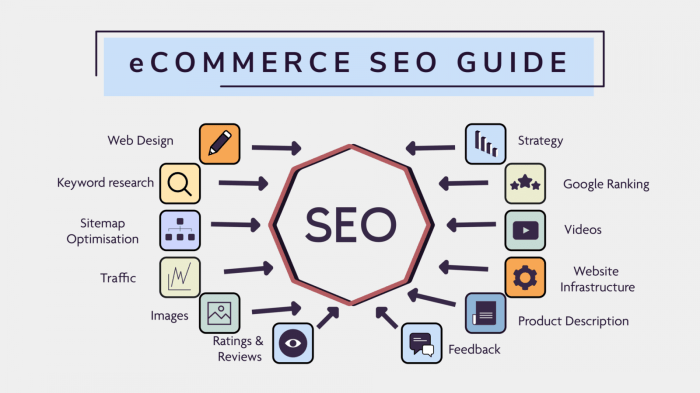E-commerce SEO Basics – Kicking off with E-commerce Basics, get ready to dive into the world of optimizing your online store for maximum visibility and sales. From on-page strategies to off-page tactics, we’ve got you covered with all the essentials you need to succeed in the digital market.
Importance of E-commerce

In today’s digital age, having a strong online presence is essential for any e-commerce business. This is where E-commerce comes into play, as it helps online stores improve their visibility and attract more potential customers. Let’s dive into why E-commerce is crucial for the success of online businesses.
Impact on Sales and Visibility
E-commerce plays a vital role in driving organic traffic to your website, which can ultimately lead to increased sales. By optimizing your website for search engines, you can improve your chances of appearing in top search results when potential customers are looking for products or services you offer. This increased visibility can result in more clicks, visits, and ultimately conversions, boosting your sales and revenue.
Benefits of Optimizing for E-commerce Websites
- Improved search engine rankings: By implementing best practices, you can climb higher in search engine results pages (SERPs) and outrank your competitors.
- Increased website traffic: With higher visibility in search results, you can attract more organic traffic to your website, leading to more potential customers.
- Enhanced user experience: optimization involves improving website speed, mobile-friendliness, and overall user experience, making it easier for visitors to navigate and find what they are looking for.
- Build trust and credibility: Appearing at the top of search results signals to users that your website is reputable and trustworthy, enhancing your brand’s credibility in the eyes of consumers.
- Cost-effective marketing strategy: Compared to paid advertising, is a long-term investment that can generate consistent traffic and results without ongoing ad spend.
On-Page for E-commerce
When it comes to E-commerce , optimizing your on-page elements is crucial for improving your website’s visibility and ranking on search engines. By focusing on specific on-page elements tailored to E-commerce, you can enhance the user experience and drive more traffic to your online store.
Optimizing Product Descriptions and Titles
Product descriptions and titles play a significant role in attracting potential customers and improving search engine rankings. Here are some key elements to consider when optimizing product descriptions and titles for E-commerce :
- Include relevant s: Incorporate s that are commonly used by your target audience when searching for products online. Make sure to include these s naturally within your product descriptions and titles.
- Provide unique and compelling content: Write engaging product descriptions that highlight the features, benefits, and unique selling points of your products. Avoid using generic descriptions that are copied from manufacturers or other websites.
- Optimize meta tags: Utilize meta titles and descriptions to provide a concise summary of your products. Make sure to include relevant s and compelling descriptions that encourage users to click through to your website.
- Use high-quality images: Visual content is essential for E-commerce websites. Include high-quality images of your products from multiple angles to give users a better understanding of what they are purchasing.
Importance of Internal Linking for E-commerce
Internal linking is a vital on-page strategy that can improve the overall structure of your E-commerce website and enhance user navigation. Here are some reasons why internal linking is important for E-commerce :
- Enhances website navigation: Internal links help users easily navigate through your website and discover relevant products and information. By linking related pages together, you can guide users to explore more of your offerings.
- Distributes link equity: Internal links distribute link equity across your website, helping search engines crawl and index your pages more effectively. This can improve the visibility of your products in search engine results.
- Improves user engagement: By providing internal links to related products or content, you can encourage users to spend more time on your website and increase the likelihood of conversions. This can positively impact your website’s bounce rate and user retention.
- Strengthens relevance: Internal linking allows you to establish relevance between different pages on your website. By strategically linking pages with similar s, you can signal to search engines the focus of your E-commerce website.
Off-Page Strategies

In the world of E-commerce , off-page strategies play a crucial role in boosting the visibility and credibility of your online store. These strategies work outside the confines of your website to improve your search engine rankings and drive more traffic to your site.
Significance of Backlinks for E-commerce Websites
Backlinks are like upvotes from other websites, signaling to search engines that your site is reputable and trustworthy. For E-commerce websites, backlinks are particularly important as they can lead to increased organic traffic and higher rankings in search results. The more high-quality backlinks you have pointing to your site, the more authority and relevance search engines will attribute to your online store.
- Backlinks act as a vote of confidence for your E-commerce website, helping search engines understand the value and credibility of your online store.
- Quality backlinks from authoritative websites can drive referral traffic to your site, increasing your brand visibility and potential customer base.
- Building a strong backlink profile can improve your E-commerce efforts and boost your rankings in search engine results pages (SERPs).
Social Media Contribution to Off-Page Efforts
Social media platforms are not just for connecting with your audience, but they also play a significant role in off-page for E-commerce websites. By leveraging social media channels effectively, you can enhance your online presence, build brand awareness, and attract more traffic to your site.
- Social media engagement and shares can help increase your content’s visibility and reach, leading to potential backlinks from other websites.
- Active participation in social media communities can improve brand recognition and authority, which can positively impact your search engine rankings.
- Sharing valuable content on social media can encourage user engagement and interactions, creating opportunities for natural backlinks to your E-commerce site.
Role of Influencer Marketing in E-commerce
Influencer marketing has emerged as a powerful tool for E-commerce , as influencers have the ability to reach a wide audience and influence their purchasing decisions. Collaborating with influencers can help E-commerce websites gain credibility, increase brand visibility, and drive more traffic to their online stores.
- Partnering with influencers can result in valuable backlinks from their websites or social media platforms, enhancing your off-page efforts.
- Influencers can create authentic and engaging content about your products or services, reaching a targeted audience that is likely to convert into customers.
- By leveraging influencer partnerships, E-commerce websites can improve their online reputation, establish trust with potential customers, and ultimately boost their sales and conversions.
Technical for E-commerce: E-commerce SEO Basics
When it comes to E-commerce websites, technical plays a crucial role in optimizing the site for search engines. This includes various aspects such as site speed, website structure, navigation, and mobile responsiveness.
Importance of Site Speed for E-commerce
- Site speed is a critical factor in E-commerce as it directly impacts user experience and search engine rankings.
- A fast-loading website can improve bounce rates, increase conversions, and boost overall user satisfaction.
- Search engines like Google consider site speed as a ranking factor, so optimizing it can help improve your site’s visibility in search results.
Optimizing Website Structure and Navigation
- Having a clear website structure and intuitive navigation can enhance user experience and help search engines crawl and index your site effectively.
- Organize your website into categories and subcategories, making it easy for visitors to find products and information.
- Include internal linking to connect relevant pages, improve navigation, and distribute link equity throughout your site.
Significance of Mobile Responsiveness for E-commerce , E-commerce SEO Basics
- With the increasing use of mobile devices for online shopping, having a mobile-responsive website is crucial for E-commerce success.
- Mobile responsiveness ensures that your site adapts to different screen sizes and devices, providing a seamless user experience.
- Google prioritizes mobile-friendly websites in search results, so optimizing for mobile can positively impact your performance.





